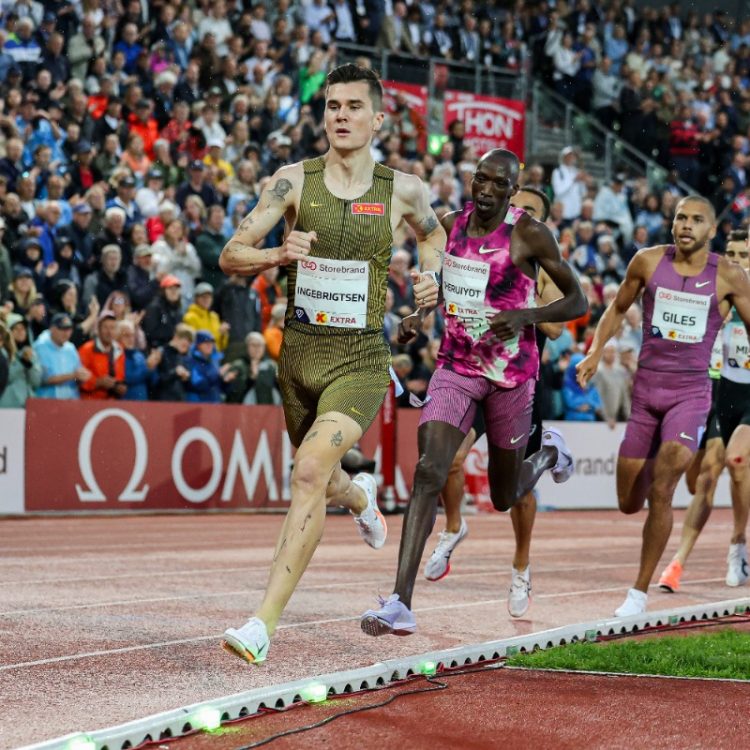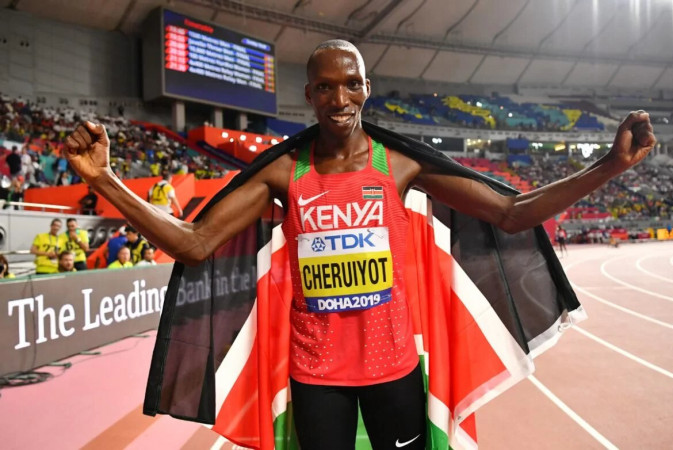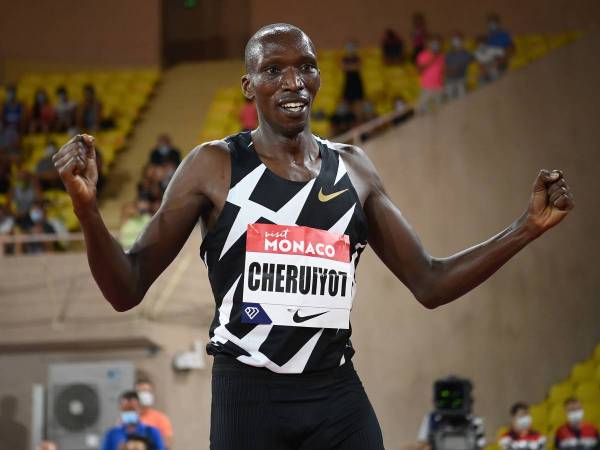Timothy Cheruiyot’s coach says he is “fine and fit.” So why in the world did athletics Kenya leave him off the Olympic team?
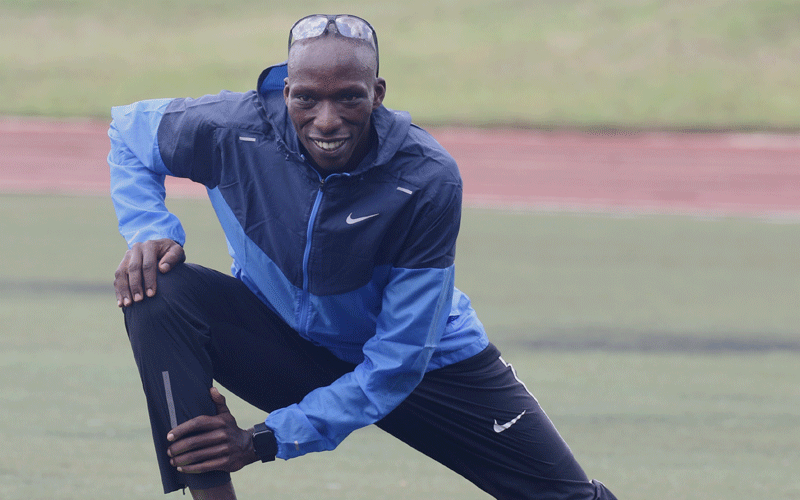
With much of the track world’s attention focused on Eugene for this week’s US Olympic Trials, few were prepared for the bombshell that dropped on Saturday from Nairobi. World champion Timothy Cheruiyot, who has been close to unbeatable over the last three years, finished fourth in the 1500 meters at the Kenyan Olympic Trials — an event in which the top two finishers in each event were guaranteed Olympic selection, assuming they had the Olympic standard. Considering Cheruiyot had won 20 of his last 22 1500/mile races, his fourth-place finish constituted quite a shock. The last time he wasn’t in the top three of a 1500/mile was more than four years ago: May 5, 2017, when he was 5th in Doha.
What happened after the race was even more shocking. When Athletics Kenya announced its Olympic team, it awarded the discretionary spot in the 1500 to the third placer Abel Kipsang, the 24-year-old who has lowered his pb from 3:35.43 to 3:32.68 this year, and not Cheruiyot, who has won the last three Diamond League 1500 titles in addition to silver and gold medals at the last two World Championships.Article continues below player
The news could have a profound effect on one of the biggest events of the Olympic Games. Cheruiyot has been — by far — the best 1500-meter runner in the world over the last years, which means that, if Athletics Kenya sticks to the team it named, the Olympic favorite will not even be in Tokyo. But Cheruiyot has also changed the way the 1500 meters has been run. In 2016, Cheruiyot also finished fourth at the Kenyan trials and missed the team. A month later, Matthew Centrowitz famously won that year’s Olympic final in 3:50.00, the slowest winning time in 84 years.
In the World Championship final a year later in London, Cheruiyot took off after 400 meters, pushing a fast tempo that resulted in a winning time of 3:33.61 and a 1-2 finish for Cheruiyot and his training partner Elijah Manangoi. In the 2019 World Championship final, Cheruiyot went even faster, winning in a wire-to-wire 3:29.26. If Cheruiyot is absent in Tokyo, the men’s 1500 will be a drastically different event.
So will he really be absent? Cheruiyot’s surprising result and the even more surprising decision to leave him off the team has drawn questions from around the globe. Here’s what we know.
What happened to Cheruiyot in the race?
Cheruiyot was widely expected to win the trials and clinch his first Olympic berth.
Since his win at the 2017 Diamond League final, Cheruiyot has not been beaten in a 1500/mile by any athlete currently competing in the sport. His only blemishes? Three runner-up finishes behind training partner Manangoi, currently serving a two-year ban for whereabouts failures. Cheruiyot had shown fitness in 2021 as well, winning his season opener in Doha on May 28 in a world-leading 3:30.48.
But in the 1500 final in Nairobi, Cheruiyot’s usual strong finish was not there. He led until the bell but was totally outclassed over the last lap and placed fourth in 3:34.36. Charles Simotwo won the race in 3:32.75, with Kamar Etyang second in 3:33.02 and Kipsang third in 3:33.12. After the race, Cheruiyot was spotted limping off to the medical tent, leading some to wonder if he was injured. You can watch the final 400 meters and post-race action below:
We reached out to Cheruiyot’s coach Bernard Ouma and he told LetsRun that Cheruiyot suffered a “slight mishap” in the race which was “sorted and fixed immediately” but added that Timothy is “fine and fit.”
Cheruiyot, for his part, posted a tweet congratulating his competitors on their performance, writing, “I’m human and wasn’t my day but I’m determined as ever!”
Why wasn’t Cheruiyot given the discretionary spot?
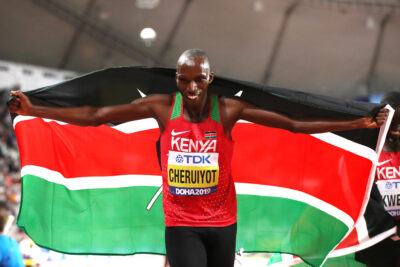
Cheruiyot after winning the 2019 world title in Doha (Photo by Alexander Hassenstein/Getty Images for IAAF)
No one can say for sure. The entire reason why federations like Kenya and Great Britain have discretionary spots in the first place is for situations exactly like this one: to ensure that one of their best athletes can still be named to the team if they have an off day at the trials. Considering Cheruiyot is the Kenyan man with the best shot at a gold medal in Tokyo this summer in any track & field event, he seemed an obvious discretionary selection. Thus there was near-universal shock when Kipsang, who beat Cheruiyot by just over a second in the 1500 on Saturday, was named to the team instead.
One possible explanation: Kipsang is represented by Golazo Sports, the Belgian agency led by Marc Corstjens. A source told us Barnabas Korir, a member of Athletics Kenya’s executive committee and AK’s chairman of youth development, has worked as Corstjens’ local representative in Kenya. Korir was also college teammates with Golazo founder Bob Verbeeck at Iowa State University. (The source also said this may have been the reason AK ran a 12-person 800-meter final after at least one Golazo athlete didn’t initially qualify).
When reached for comment by LetsRun.com, Korir claimed he has never worked for Corstjens or Golazo (despite numerous articles, coach Renato Canova, and suspended Golazo athlete Kipyegon Bett describing him as a local rep for Golazo), though said he did work with agent Gianna Demadonna prior to joining Athletics Kenya in 2007. Korir also said that, since he is not a member of the selection committee for Team Kenya, he has no input on team selection.
LetsRun reached out to Athletics Kenya and Corstjens but did not immediately hear back.
Is there any legitimate reason why Kipsang was chosen over Cheruiyot? Well there is a case to be made.
-Kipsang beat Cheruiyot head-to-head at the Kenyan trials.
-Kipsang has been running very well in 2021. Heading into the Kenyan trials, he had won five of his six 1500 races, including a 3:33.99 pb win in Montreuil on June 1 and a 3:32.68 win in Marseille on June 9 (#2 on the Kenyan list this year behind Cheruiyot who has run 3:30.48). His lone defeat came on June 6 in Hengelo, where he ran 3:35.63 to finish second behind Jake Wightman.
-It’s possible Cheruiyot is more banged up than his coach is letting on, while Kipsang appears to be healthy.
The case for Cheruiyot: he has been near-unbeatable for the last three years, his personal best of 3:28.41 is almost four seconds faster than Kipsang’s (and #7 all-time) and he has earned silver and gold in his last two appearances at global championships.
This situation would be easier if Etyang, who had run virtually no races of significance prior to this year and entered the trials without the Olympic standard (he had a 3:36.80 pb before running 3:33.02 in the final), had finished third instead of Kipsang. Kipsang has been one of the world’s best 1500 runners in 2021 and is a worthy Olympian. But based on past accomplishments, Cheruiyot seems far more likely than Kipsang to win Kenya’s first Olympic men’s 1500 title since Asbel Kiprop in 2008.
What happens now? Is there any way Cheruiyot could still be placed on the team?
If you’re Matthew Centrowitz or Jakob Ingebrigtsen, it’s not time to start celebrating just yet. There are a couple of ways in which Cheruiyot could still make it to Tokyo.
The first is if Athletics Kenya changes its mind. If AK faces public pressure and Cheruiyot continues running well on the international circuit, AK could decide it made a mistake in naming Kipsang and put Cheruiyot on the team.
The other way involves a technicality. Because Kenya is a Category A federation — the highest risk level of doping according to World Athletics — any athlete representing Kenya at an Olympics or World Championships must have passed at least three out-of-competition drug tests in the previous 10 months. For an athlete in the World Athletics Testing Pool, like Cheruiyot, this is not a problem. But for Kamar Etyang, who was mostly unknown until this year, it could be a significant issue; in 2019, the top two finishers in the men’s 5,000 at the Kenyan World Championship trials (Michael Kibet and Daniel Simiyu) were not allowed to compete at Worlds due to insufficient out-of-competition testing. If Etyang hasn’t been tested enough, he won’t be allowed to compete and Cheruiyot, as the fourth placer at the trials, would be the natural replacement.
With the fate of one of the world’s best athletes in the balance, this case may not be over yet. Watch this space.
Discuss this topic on our world famous messageboard.
